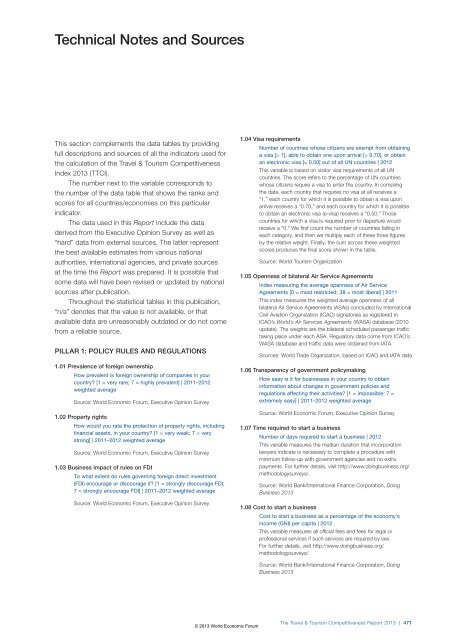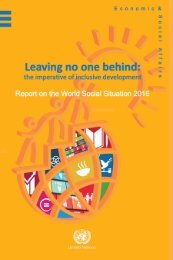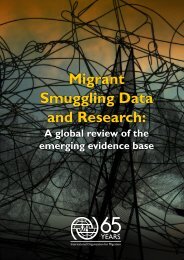The Travel & Tourism Competitiveness Report 2013
The Travel & Tourism Competitiveness Report 2013
The Travel & Tourism Competitiveness Report 2013
You also want an ePaper? Increase the reach of your titles
YUMPU automatically turns print PDFs into web optimized ePapers that Google loves.
Technical Notes and Sources<br />
This section complements the data tables by providing<br />
full descriptions and sources of all the indicators used for<br />
the calculation of the <strong>Travel</strong> & <strong>Tourism</strong> <strong>Competitiveness</strong><br />
Index <strong>2013</strong> (TTCI).<br />
<strong>The</strong> number next to the variable corresponds to<br />
the number of the data table that shows the ranks and<br />
scores for all countries/economies on this particular<br />
indicator.<br />
<strong>The</strong> data used in this <strong>Report</strong> include the data<br />
derived from the Executive Opinion Survey as well as<br />
“hard” data from external sources. <strong>The</strong> latter represent<br />
the best available estimates from various national<br />
authorities, international agencies, and private sources<br />
at the time the <strong>Report</strong> was prepared. It is possible that<br />
some data will have been revised or updated by national<br />
sources after publication.<br />
Throughout the statistical tables in this publication,<br />
“n/a” denotes that the value is not available, or that<br />
available data are unreasonably outdated or do not come<br />
from a reliable source.<br />
PILLAR 1: POLICY RULES AND REGULATIONS<br />
1.01 Prevalence of foreign ownership<br />
How prevalent is foreign ownership of companies in your<br />
country? [1 = very rare; 7 = highly prevalent] | 2011–2012<br />
weighted average<br />
Source: World Economic Forum, Executive Opinion Survey<br />
1.02 Property rights<br />
How would you rate the protection of property rights, including<br />
financial assets, in your country? [1 = very weak; 7 = very<br />
strong] | 2011–2012 weighted average<br />
Source: World Economic Forum, Executive Opinion Survey<br />
1.03 Business impact of rules on FDI<br />
To what extent do rules governing foreign direct investment<br />
(FDI) encourage or discourage it? [1 = strongly discourage FDI;<br />
7 = strongly encourage FDI] | 2011–2012 weighted average<br />
Source: World Economic Forum, Executive Opinion Survey<br />
© <strong>2013</strong> World Economic Forum<br />
1.04 Visa requirements<br />
Number of countries whose citizens are exempt from obtaining<br />
a visa [= 1], able to obtain one upon arrival [= 0.70], or obtain<br />
an electronic visa [= 0.50] out of all UN countries | 2012<br />
This variable is based on visitor visa requirements of all UN<br />
countries. <strong>The</strong> score refers to the percentage of UN countries<br />
whose citizens require a visa to enter the country. In compiling<br />
the data, each country that requires no visa at all receives a<br />
“1,” each country for which it is possible to obtain a visa upon<br />
arrival receives a “0.70,” and each country for which it is possible<br />
to obtain an electronic visa (e-visa) receives a “0.50.” Those<br />
countries for which a visa is required prior to departure would<br />
receive a “0.” We first count the number of countries falling in<br />
each category, and then we multiply each of these three figures<br />
by the relative weight. Finally, the sum across these weighted<br />
scores produces the final score shown in the table.<br />
Source: World <strong>Tourism</strong> Organization<br />
1.05 Openness of bilateral Air Service Agreements<br />
Index measuring the average openness of Air Service<br />
Agreements [0 = most restricted; 38 = most liberal] | 2011<br />
This index measures the weighted average openness of all<br />
bilateral Air Service Agreements (ASAs) concluded by International<br />
Civil Aviation Organization (ICAO) signatories as registered in<br />
ICAO’s World’s Air Services Agreements (WASA) database (2010<br />
update). <strong>The</strong> weights are the bilateral scheduled passenger traffic<br />
taking place under each ASA. Regulatory data come from ICAO’s<br />
WASA database and traffic data were obtained from IATA.<br />
Sources: World Trade Organization, based on ICAO and IATA data<br />
1.06 Transparency of government policymaking<br />
How easy is it for businesses in your country to obtain<br />
information about changes in government policies and<br />
regulations affecting their activities? [1 = impossible; 7 =<br />
extremely easy] | 2011–2012 weighted average<br />
Source: World Economic Forum, Executive Opinion Survey<br />
1.07 Time required to start a business<br />
Number of days required to start a business | 2012<br />
This variable measures the median duration that incorporation<br />
lawyers indicate is necessary to complete a procedure with<br />
minimum follow-up with government agencies and no extra<br />
payments. For further details, visit http://www.doingbusiness.org/<br />
methodologysurveys/.<br />
Source: World Bank/International Finance Corporation, Doing<br />
Business <strong>2013</strong><br />
1.08 Cost to start a business<br />
Cost to start a business as a percentage of the economy’s<br />
income (GNI) per capita | 2012<br />
This variable measures all official fees and fees for legal or<br />
professional services if such services are required by law.<br />
For further details, visit http://www.doingbusiness.org/<br />
methodologysurveys/.<br />
Source: World Bank/International Finance Corporation, Doing<br />
Business <strong>2013</strong><br />
<strong>The</strong> <strong>Travel</strong> & <strong>Tourism</strong> <strong>Competitiveness</strong> <strong>Report</strong> <strong>2013</strong> | 471

















